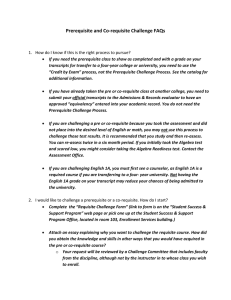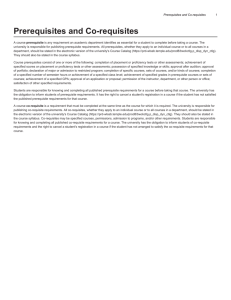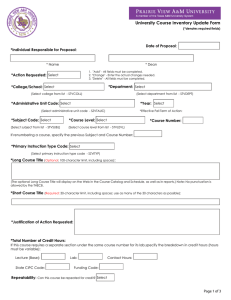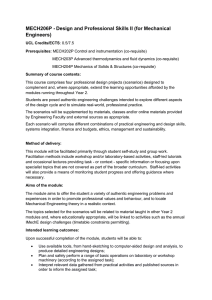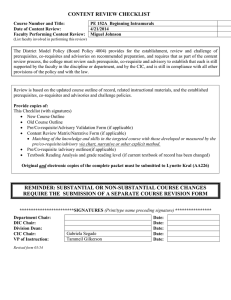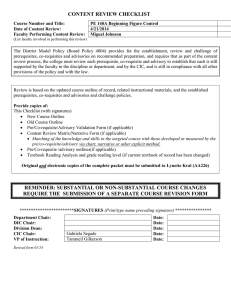Content-Review-Forms-2014-15 for Bus. 29... 169KB Sep 07 2015 09:47:38 PM
advertisement
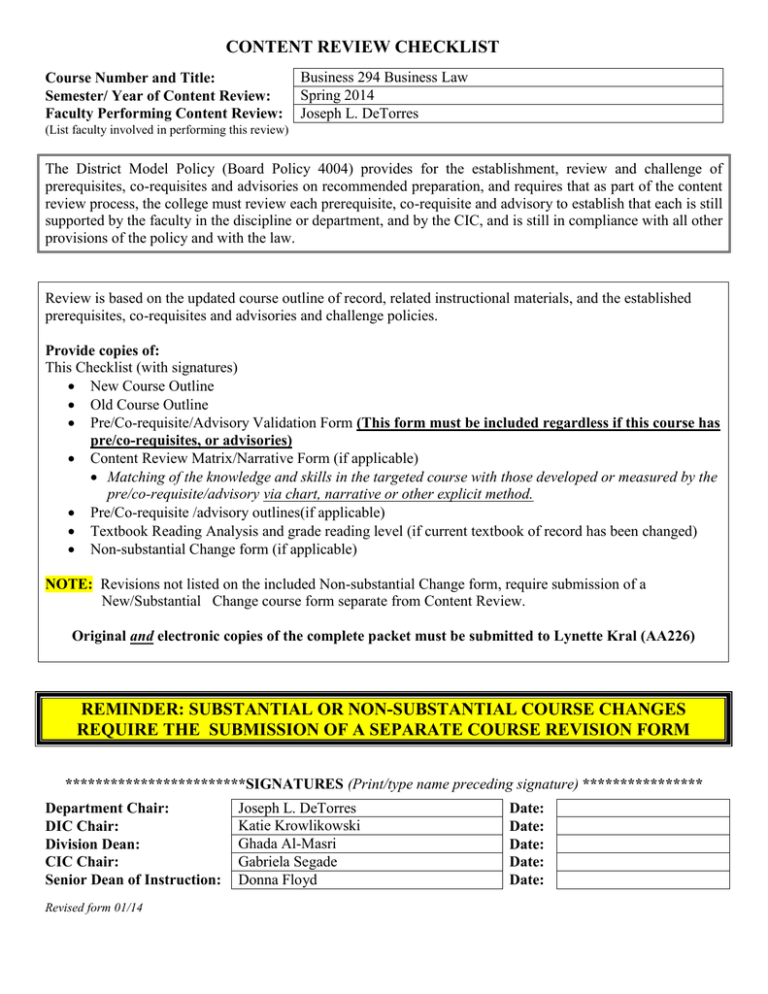
CONTENT REVIEW CHECKLIST Course Number and Title: Semester/ Year of Content Review: Faculty Performing Content Review: Business 294 Business Law Spring 2014 Joseph L. DeTorres (List faculty involved in performing this review) The District Model Policy (Board Policy 4004) provides for the establishment, review and challenge of prerequisites, co-requisites and advisories on recommended preparation, and requires that as part of the content review process, the college must review each prerequisite, co-requisite and advisory to establish that each is still supported by the faculty in the discipline or department, and by the CIC, and is still in compliance with all other provisions of the policy and with the law. Review is based on the updated course outline of record, related instructional materials, and the established prerequisites, co-requisites and advisories and challenge policies. Provide copies of: This Checklist (with signatures) New Course Outline Old Course Outline Pre/Co-requisite/Advisory Validation Form (This form must be included regardless if this course has pre/co-requisites, or advisories) Content Review Matrix/Narrative Form (if applicable) Matching of the knowledge and skills in the targeted course with those developed or measured by the pre/co-requisite/advisory via chart, narrative or other explicit method. Pre/Co-requisite /advisory outlines(if applicable) Textbook Reading Analysis and grade reading level (if current textbook of record has been changed) Non-substantial Change form (if applicable) NOTE: Revisions not listed on the included Non-substantial Change form, require submission of a New/Substantial Change course form separate from Content Review. Original and electronic copies of the complete packet must be submitted to Lynette Kral (AA226) REMINDER: SUBSTANTIAL OR NON-SUBSTANTIAL COURSE CHANGES REQUIRE THE SUBMISSION OF A SEPARATE COURSE REVISION FORM ************************SIGNATURES (Print/type name preceding signature) **************** Department Chair: DIC Chair: Division Dean: CIC Chair: Senior Dean of Instruction: Revised form 01/14 Joseph L. DeTorres Katie Krowlikowski Ghada Al-Masri Gabriela Segade Donna Floyd Date: Date: Date: Date: Date: NON-SUBSTANTIAL COURSE/CATALOG CHANGE DURING CONTENT REVIEW Please mark an "X" in the box of the item that has been revised. X Course Title Course Description Hours per term Grade Option Pre/Co-requisite/Advisory X X X X X Course Objectives/Course Content Methods of Instruction Outside Class Weekly Assignments Instructional Materials Student Evaluation Reason for Change The above items are being revised on the course outline to reflect the current approach to the study of laws affecting the business environment. The revisions are also being made to adhere to the transfer course guidelines required by state TMC and C-ID procedures for transferability. CURRENT COURSE INFORMATION (Fill in the current department/course number/title and only areas that are being revised) Course Number/Title: BUS 294 Business Law Hours per semester: Lecture: Grade Option: Letter Lab: HBA (Lecture): Student Choice HBA (Lab): Pass/No Pass Pre-requisite(s): Co-requisite(s): Advisory(ies): CHANGE TO: Check box and fill in those parts that are being revised. Course Title (limited to 39 character spaces): X Course Catalog Description: (Type new course description in expanding box below) This course presents fundamental legal principles surrounding business activities and transactions. The legal process is also reviewed. Legal topics include ethics, contracts, torts, agency, criminal law, business organizations, and judicial and administrative processes. Hours per term: Lecture: Lab: Grade Option: Letter Grade Student Choice Prerequisite: Delete: Add: Prerequisite: Delete: Add: Co-requisite: Delete: Add: Co-requisite: Delete: Add: Advisory: Delete: Add: HBA (Lecture): Pass/No Pass HBA (Lab): This form must be included regardless if this course has pre/co-requisites, or advisories CONTRA COSTA COLLEGE PRE/CO-REQUISITE/ADVISORY VALIDATION FORM [Use one validation form per pre/co-requisite, advisory except when Pre/Co-requisites are linked by “or” statements] Course Number and Title: BUS 294 Business Law Pre/Co-requisite/Advisory to be validated: X Yes No There is no prerequisite. The department has reviewed each prerequisite, co-requisite, or advisory to establish that each is still supported by the faculty in the discipline or department, or that the student would not benefit from an additional prerequisite, co-requisite, or advisory to this course. Content review is required for any prerequisite, co-requisite, or advisory to determine whether students who do not meet the specified standard are highly unlikely to receive a satisfactory grade in the course [Title 5, Section 55201 (b) (1]. This validation is separate from course approval. Additional scrutiny may be required, depending on the type of pre/co-requisite. Directions: Circle, or highlight one of the following and attach required justification AND content review documentation. 1. This course has no course pre/co-requisites or advisories. 2. The course is an advisory only. 3. This is a lab course. The primary course, ___________________, will have the validation evidence. 4. This pre/co-requisite is required in order to make the course acceptable for transfer by the UC or CSU systems. Attach documentation (catalog descriptions) from three or more UC/CSU campuses. 5. This course is part of a sequence of courses within and/or across disciplines. Attach a copy of the course outline that includes a list of the specific skills and knowledge that the student must possess to be ready to take the course. 6. The prerequisite is required for enrollment in a program. Program name: ________________________ Program prerequisite(s) must be approved as provided for at least one required course in the program, of which this is one. Attach copy of course outline specifying skills and/or knowledge that student must possess. 7. This prerequisite is required for the health or safety of the students in the course; students who lack this prerequisite might endanger themselves or other students. Attach a copy of the course outline that specifically lists what the student must possess before entering the course. 8. This pre/co-requisite is required by law or government regulation. Attach a copy of pertinent law or regulation. 9. This pre/co-requisite is one of recency or another measure of readiness. Attach both a copy of the course outline listing the specific skills student must possess AND data gathered as directed by the District Model Policy. 10. This prerequisite involves a limitation on enrollment. This includes auditions for performance courses, honors courses or sections, and blocks of courses or sections created to set up a cohort of students (such as PACE). Attach documentation as directed by pertinent sections of the District Model Policy. *** NOTE: In addition to rigorous content review, an instructor may request a study of the empirical relationship between a prerequisite course (or placement tool) and subsequent student performance in the targeted course. The rigor of content review will be established on a college-wide basis in conjunction with District research requirements. Revised form 01/14 CONTENT REVIEW MATRIX FOR EVALUATING PRE/CO-REQUISITES/ADVISORIES Pre/Co-requisites must have established challenge policies Course Number: Course Title: Pre-requisite: Co-requisite: Advisory: Pre/Co-requisite Challenge Policy: List applicable CONTENT of the course being reviewed 1. 2. 3. 4. 5. 6. 7. 8. 9. 10. List applicable Course OBJECTIVES of the pre/co-requisite course 1. 2. 3. 4. 5. 6. 7. 8. 9. 10. Option A - List conclusions below regarding the necessity and appropriateness of the proposed pre-requisite, co-requisite. Option B – complete the following tables and matrix Revised form 01/14 Contra Costa College Course Outline Course Number Course Title Prerequisite Challenge Policy Co-requisite Challenge Policy Advisory BUS 294 Business Law None None None None None *HOURS BY ARRANGEMENT: NA Number of Weeks Lecture Hours By Term Lab Hours By Term *Hours By Arrangement Units 18 54 0 0 3 Hours per term. ACTIVITIES: (Please provide a list of the activities students will perform in order to satisfy the HBA requirement): COURSE/CATALOG DESCRIPTION This course presents fundamental legal principles surrounding business activities and transactions. The legal process is also reviewed. Legal topics include ethics, contracts, torts, agency, criminal law, business organizations, and judicial and administrative processes. COURSE OBJECTIVES: At the completion of the course the student will be able to: Analyze various business scenarios and be able to identify the appropriate legal principles that apply to them. Distinguish the differences between tort and criminal law, and explain why they are important to business. Distinguish between contracts under the UCC and those governed by the common law. Explain why contract law is crucial to successful business ventures; demonstrate knowledge of its elements, and their application in identifying remedies for contractual breach. Demonstrate knowledge of the sources of American Law, i.e., Common, Constitutional, Statutory, and Administrative, and how they became a part of the uniform commercial code. Demonstrate knowledge of the historical underpinnings of the law, and how they have developed in America; explain the makeup of the state and federal court systems, and how violations of the law are prosecuted. Demonstrate an ability to develop a legal position, and how to research the legal principles to carry the position in court. Explain the legal differences inherent in the various forms of business organizations, as well as the relationships between their ownership principals, management, agents, and other stakeholders. Explain where the government gets its legal authority to regulate business entities, their ownership and leadership, and their operations. Explain the difference between legal and ethical principles, and the reasons why ethical behavior in business is emphasized in today’ market transactions. Identify the various governmental entities that legally regulate business, and explain the affect of their regulatory powers over the growth and advancement of business operations. Explain how the use of the internet has both facilitated and limited the progress of business development and expansion. INTENDED STUDENT LEARNING OUTCOMES: Be able to recognize and analyze legal problems, and choose and defend resolutions based on legal principles within the context of the global economy. Be able to demonstrate awareness of, and appreciation for, difficult legal principles that apply to ethical behavior in business settings. Be able to demonstrate ability to effectively research and compile authority-based legal documentation/information that clearly support legal conclusions. Be able to distinguish between tort and contractual law principles, as well as between civil claims and criminal liability. Be able to demonstrate what and how legal cases advance through the various court systems. COURSE CONTENT (Lecture): Introduction to American Law – its sources and origin; its various classifications The differences between torts and crimes – civil vs. criminal; intentional torts vs. negligence; strict liability and white collar torts and crimes; the uniform commercial code and tort reform The state and federal court system/structure; the importance of jurisdiction; the role of legal participants in court; the appellate process, and its importance; the role of the State and Federal Supreme Courts The origin and regulation of contracts; the various kinds, and their impact on business operations; performance, breach, enforcement, and remedies The various forms of business entities – sole proprietorships, partnerships, limited and limited liability partnerships, limited liability companies, and corporations – their structure, governance, and value What effect crimes have on business operations; the role that the U.S. Constitution plays in business ventures The agency relationship – their creation, duties of agents and principals; liability of principals and agents The differences/similarities between law and ethics; concept of social responsibility, stakeholder relationship/responsibility and duty to exercise ethical behavior, and ethical decision making Negotiable instruments; sales and leases; personal property and bailments; real property – landlord and tenant law; wills and trusts; credit and risks COURSE CONTENT (Lab): METHODS OF INSTRUCTION: Quizzes Case Study Analyses Essay Papers Final Examination INSTRUCTIONAL MATERIALS: NOTE: To be UC/CSU transferable, the text must be dated within the last 7 years OR a statement of justification for a text beyond the last 7 years must be included. Textbook Title: Author: Publisher: Edition/Date: Justification Statement: Textbook Reading Level: Business Law: Text and Exercises Roger LeRoy Miller and William Eric Hollowell South-Western/Cengage Learning, Inc. 7th Edition (2014) (For textbook beyond 7 years) College-Level (see attached Flesch Reading and Grade Level Confirmation) Lab Manual Title (if applicable): Author: Publisher: Edition/Date: OUTSIDE OF CLASS WEEKLY ASSIGNMENTS: Title 5, section 55002.5 establishes that a range of 48 -54hours of lecture, study, or lab work is required for one unit of credit. For each hour of lecture, students should be required to spend an additional two hours of study outside of class to earn one unit of credit. Title 5, section 55002(a) 2F establishes that coursework calls for critical thinking and the understanding and application of concepts determined by the curriculum committee to be at college level. For degree applicable courses: List one example of critical thinking homework Outside of Class Weekly Assignments Hours per week Weekly Reading Assignments (Include detailed assignment below, if applicable) 2 Students are to regularly read weekly chapter assignments in preparation for weekly lecture and discussion, as outlined in syllabus, i.e., Chapter 1 – Introduction to the Law and Our Legal System; Chapter 2 – Ethics in Business; Chapter 3 – The Courts and Alternative Dispute Resolution. Weekly Writing Assignments (Include detailed assignment below, if applicable) 2 Students are to complete assigned weekly written issue spotter (case study) at the end of each chapter (using appropriate submission format as shown in syllabus), and submit for review and grading, i.e., Chapter 1 – Issue Spotter #1, p. 11; Chapter 2 – Issue Spotter #1, p. 27; Chapter 3 – Issue Spotter #2, p. 45. Submitted issue spotters will be completed in the following format: A. Typed Questions; B. Analysis and Conclusion; and, C. Text Authority Citation. Weekly Math Problems (Include detailed assignment below, if applicable) 0 Lab or Software Application Assignments (Include detailed assignment below, if applicable) 0 Other Performance Assignments (Include detailed assignment below, if applicable) 2 Students are to regularly meet in assigned study groups to jointly study for exams, and discuss assigned legal cases in preparation for in-class conceptual analysis and discussion. STUDENT EVALUATION: (Show percentage breakdown for evaluation instruments) Title 5, section 55002 (a) 2A establishes that the grade is based on demonstrated proficiency in subject matter and the ability to demonstrate that proficiency. For degree applicable courses: Course requires essay writing, or, in courses where the curriculum committee deems them to be appropriate, by problem solving exercises, or skills demonstrations by students. Title 5, section 55002(a) 2F establishes that coursework calls for critical thinking and the understanding and application of concepts determined by the curriculum committee to be at college level. For degree applicable courses: List critical thinking example(s) of methods of evaluation 40 40 20 % Essay Analysis of Issue Spotter (Case Studies), and Written Essay Assignments. Computation or Non-computational Problem Solving Skills % Skills Demonstration % Objective Examinations % % % % Other (describe) Chapter quizzes. GRADING POLICY: (Choose LG, P/NP, or SC) Pass / No Pass X Letter Grade 90% - 100% = A 80% - 89% = B 70% - 79% = C 60% - 69% = D Below 60% = F 70% and above = Pass Below 70% = No Pass Prepared by: Joseph L. DeTorres Date: September 5, 2015 Revised form 09/14 Student Choice 90% - 100% = A 80% - 89% = B 70% - 79% = C 60% - 69% = D Below 60% = F or 70% and above = Pass Below 70% = No Pass
